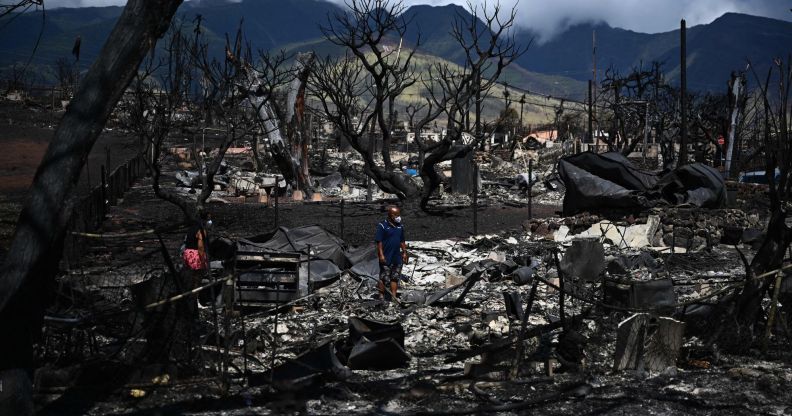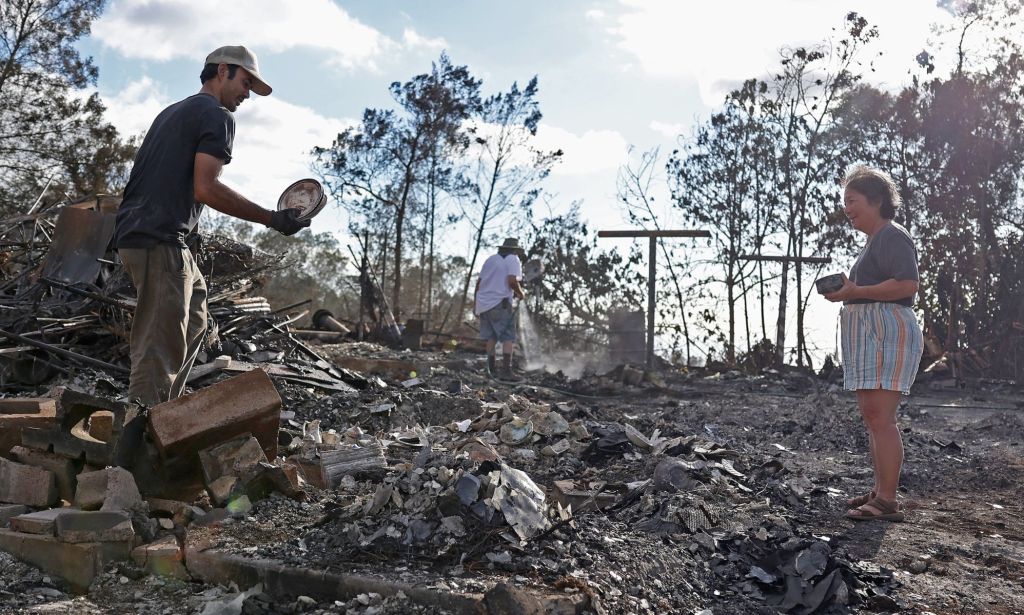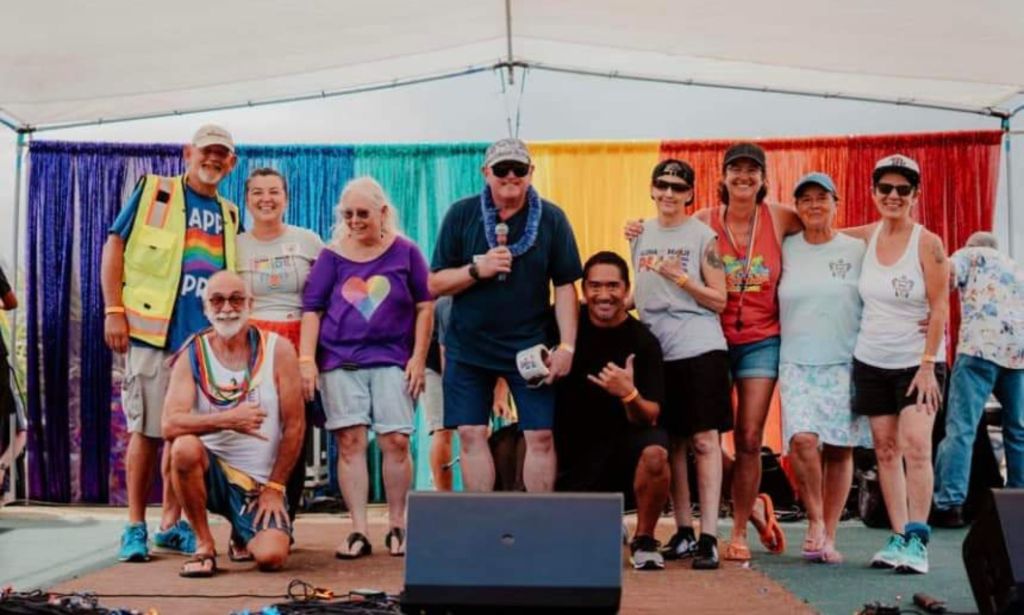‘Everything was gone in minutes’: How queer people on Maui came together after devastating wildfires

On 8 August, wildfires devastated the island of Maui. A month later, LGBTQ+ locals and Hawaiian advocates share how queer folks can help those impacted. (Getty)
On 8 August, wildfires ripped through the Hawaiian island of Maui. The inferno destroyed homes, schools and businesses, forcing thousands to abandon their beloved spaces and flee for their lives.
Maui County Officials announced on Sunday (3 September) that the Lahaina fire is 100 per cent contained, with the fires having impacted 2,170 acres on the island. The Kula fire is 95 per cent contained, and the Olinda fire, which affected over 1,081 acres, is 90 per cent contained.
More than 115 lives have been lost so far, and over 385 people are still missing after the deadliest wildfire in the United States for more than a century.
The blazes reduced historic and vibrant Lahaina – the original capital of the Hawaiian Kingdom – to ashes, devastating the touristic and economic hub on the island’s western edge in the process.
Kawai Sellers, a volunteer with LGBTQ+ support non-profit Aloha Maui Pride (AMP), worked in Lahaina most of his adult life and was a server at a luau, (a traditional Hawaiian party or feast, usually accompanied by entertainment) until his workplace was “flattened to the ground” by the fires.
Sellers describes how fires broke out across the island as wind gusts, which reached up to 80mph (128km/h), fanned the flames. A flare up at around 3.30pm prompted evacuations, and some people fled into the Pacific Ocean in an attempt to escape the encroaching flames.
“Everything in a matter of minutes, a blink of an eye, was gone the way the wind was carrying all that fire,” he says.
“People [were] being trapped on Front Street and Lahainaluna so that’s why people had nowhere to go and no place to turn around and tunnelled onto Front Street, and that’s how they ended up in the water.”
Antonia Debevec, AMP’s planning liaison, spoke with somebody who “spent nine hours in the water” before crawling up onto nearby rocks, shaking from the devastation.
“By the next day, the entirety of Front Street was gone,” Debevec says.
“Huge amounts of neighbourhoods where people had their whole ‘ohana – their whole family and friends in one small area with four, five or six houses – all gone.”

Many local residents are now living in emergency accommodations. Sellers has had an “influx of people” coming and staying at his house. Others slept in the cars, local areas and any space they could after their homes were destroyed.
“I have close contacts with trans women from Lahaina who lost everything,” he says.
“When the fires happened, and everybody dispersed and tried to run for their lives, we were trying to reach out to them, but the west side had no communication … So it took about four or five days before we found out where they went.
“Some of them had to sleep in the Walmart parking lot and had to catch a ride with a neighbour.
“One girl, I spoke with her yesterday, her family is from Lahaina. All they know is Lahaina. But her grandmother is elderly. She was there taking care of her, and they had to run for their lives.
“It’s just trying to pick up all the pieces when you have – it’s not a piece. It’s just dust everywhere.”
Officials have warned the death toll from the Maui wildfires could rise as people search for their loved ones through the ashes and rubble, and crews move to the ocean in search of remaining victims.
Maui facing steep financial cost to the rebuild
Officials believe it will take years and billions in funding to restore the devastated areas. Scientists have warned that toxic runoff from burned land – expected during future rain storms – could damage Maui’s coral reef.
AMP established a GoFundMe to assist LGBTQ+ folks and queer-friendly businesses in the local area affected by the fires.
Sherry Alu Campagna, an environmental scientist and is also affiliated with AMP, says many people, whether they are LGBTQ+ or not, have been affected by the disaster because the “fire did not discriminate”.
She adds the people of Maui and Hawaii more broadly are the “first ones to offer relief to those in our community” and “absorb the needs of those around us”.

But most people who live in Maui are already struggling to sustain themselves, and Campagna says locals won’t be able to survive if the economy doesn’t recover soon.
“Without the economy stabilised here on the island and with this recession looming, I’m concerned we won’t be able to make enough money to sustain ourselves – let alone help those in our community that need our help,” she says.
The Hawaii Tourism Authority said West Maui accounts for 15 per cent of Hawaii’s total tourism revenue. The state has lost approximately $9 million per day since the wildfires because of the resulting drop in tourism and travel to the island.
Tyler Iokepa Gomes, chief administrator for Kilohana, a division of the Council for Native Hawaiian Advancement (CNHA), explains that one of Hawaii’s “greatest resources is this concept of aloha”, which is a “reciprocal sharing, respect, honesty, love and appreciation” that Hawaiians have “endlessly shared” with others.
Beyond donating to relief efforts, Gomes says LGBTQ+ people can offer their support by “honouring the fact” that much of the island remains open to tourists, and supporting locally-owned businesses is a “really great way to share your aloha back with the community”.
One of the LGBTQ+ community’s biggest assets is its “almost limitless level of acceptance and welcoming”, which Gomes says is “inherently aloha”.
So, he says, it’s important for queer folks to show their love and allyship to those impacted by the Maui wildfires.
“At this time, what Hawaii is looking for is allyship from our visitors,” Gomes continues. “For a long time, we’ve given so much, and there’s been an entire industry based on the backs of our culture.
“That culture has been bastardised. It’s been prostituted. It’s been marginalised in every way possible, and we’ve continued to give.
“Our grandparents danced in hula shows, our parents danced in hula shows, our contemporaries danced in hula shows – and that probably won’t stop because we want to share.
“I think the queer community, being one of the more accepting communities, this is a destination that has promised aloha to you.
“If you were looking for a place of safety in which you could return the favour and it not necessarily have to be monetarily but in you returning that level of care, reciprocity and appreciation, this is it.”
The CNHA’s Kākoʻo Maui Fund is providing vital resources for the recovery efforts, and the nonprofit is matching the donations with the help of dozens of other organisations.
LGBTQ+ folks and allies can also show their support for the people of Maui by signing a petition calling on local officials to “prevent land grabs in Lāhainā” and “stop the further exploitation of Maui’s land and people for private profits”.
How did this story make you feel?

